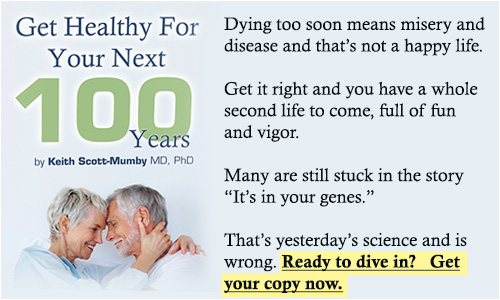When will the pendulum swing away from the nonsensical obsessive focus on lipid metabolism and move to viscosity and clotting? Most fatal cardiovascular events are blood clots, not fat sludge!
Now a new study from Edinburgh University in the UK has shown conclusively that blood viscosity (its free flowing liquid vs. sludging characteristic) is crucial. It is NOT the quality of artery walls that matters; it’s the quality of the blood itself.
Raised blood viscosity is at least as important as two old favorites: blood pressure and “bad” cholesterol (LDL) in predicting death by heart attack. PLUS: THEY SHOWED IT’S MORE IMPORTANT THAN SMOKING AS A RISK FACTOR.
This is so obviously important that only doctors making money off the outdated nonsense of chasing cholesterol levels for a living will fail to act on this research and incorporate it in patient care. Big Pharma will try to smother the research, because cholesterol-controlling statin drugs are still their number one profit earner, worldwide.
Study Details...
The Edinburgh Artery Study, as it’s called, looked at a random population of 1,592 men and women aged 55 to 74 years, who were followed over a mean period of 5 years. After adjustment for age and gender, the levels of blood viscosity and a related measurement were consistently raised in patients who had experienced a bad cardiovascular event, such as heart attacks or stroke. 1
In a seminal report just prior to the publication of the Edinburgh Artery Study, Lousiana State University pathologist Gregory Sloop proposed that blood viscosity is the one unifying mechanism by which pulls together and makes sense out of all currently accepted cardiovascular risk factors, including LDL cholesterol, high blood pressure, diabetes, obesity and smoking.2
Moreover, numerous other published studies have confirmed the link between blood viscosity and the following cardiovascular risk factors:
 |
Hypertension 3-6
|
 |
Hyperlipidema: positive correlation with LDL cholesterol, total cholesterol and
triglycerides; negative correlation with HDL cholesterol 7-13
|
 |
Diabetes, insulin resistance syndrome and obesity 12,14-18
|
 |
Tobacco smoking 6,19-21
|
 |
Male gender vs. premenopausal women 12-13,22-23
|
 |
Aging 12,21,24 |
In his report, which was titled A Unifying Theory of Atherogenesis, Dr. Sloop indicated that blood viscosity was uniquely suited to predict the entire course of cardiovascular disease because blood viscosity accomplishes the following:
Accounts for the morphological similarity of atherosclerotic lesions associated with many diverse risk factors, Explains the anatomic distribution of lesions throughout the body, Provides a role for platelet activation by turbulent blood flow caused by hyper-viscosity, Includes an explanation of the protective role of HDL “good” cholesterol (i.e., HDL has been shown experimentally to lower viscosity). 2
Blood viscosity holds certain similarities with blood pressure. Like blood pressure, the viscosity of blood changes during each cardiac cycle and is reported using two numerical quantities: systolic and diastolic viscosity.
However, while blood pressure is parameter of the circulatory system as a whole, blood viscosity is a parameter specific to the fluid flowing through the system. Therefore, viscosity can be said to precede pressure and therefore to be more fundamental than pressure.
What’s To Be Done?You need to make sure that, if you are in medical care, your physicians are using viscosity measurements to monitor your risks. If they are not, demand they do or change to a different physician. Otherwise you will join the army of 50% of citizens who die of cardiovascular events.
Do NOT accept Coumadin as a means of controlling clotting risk because:
-
It’s dangerous in its own right (a whole other story)
-
It’s solving the wrong problem (it does nothing for viscosity)
Take plenty of omega-3s, as we always tell you. It’s anti-inflammatory, slows blood clotting and, if you like, “thins the blood”. Be sure to discontinue it before dental or surgical treatment, otherwise the dentist or surgeon will have trouble stopping the bleeding! That’s how good it is.
If you have already had an adverse event, get Dr. Garry Gordon’s “Beyond Chelation Improved” formula (BCI). Dr. Gordon boasts ten million dollars of published research behind it and that it eliminates those fatal CV events, because BCI lowers blood viscosity. While taking BCI, no one has suffered a fatal cardiovascular event or stroke in over a decade.
“No matter how serious the clinical picture is (i.e. High Grade LAD vascular occlusive disease, diabetes, lipid issues, high CRP) my patients are all routinely protected against MI and stroke,” Dr. Gordon says (personal communication, Sep 27th, 2013)
 Finally, invest in a PEMF device and use it on yourself regularly. The PEMF-100 is the one I would recommend. Immediately after use, microscopic examination of the blood shows that the “sticky” parcels of red cells have broken up and the blood is much more free-flowing. Finally, invest in a PEMF device and use it on yourself regularly. The PEMF-100 is the one I would recommend. Immediately after use, microscopic examination of the blood shows that the “sticky” parcels of red cells have broken up and the blood is much more free-flowing.
Ten to fifteen minutes a day could keep your blood youthful for many decades to come!
If you can’t afford the considerable expense of one of these devices, find a local practitioner who has got one or is willing to buy one for his or her practice. Book yourself in regularly for sessions. PEMF devices are the future, according to doctors like Garry Gordon.
To Staying Young,

Prof. Keith Scott-Mumby
References
1. Lowe GD, Lee AJ, Rumley A, et al. Blood viscosity and risk of cardiovascular events: the Edinburgh Artery Study. Br J Haematol 1997; 96:168-173.
2. Sloop GD. A unifying theory of atherogenesis. Med Hypotheses. 1996; 47:321-5.
3. Smith WC, Lowe GD, et al. Rheological determinants of blood pressure in a Scottish adult population. J Hypertens 1992; 10:467-72.
4. Letcher RL, Chien S, et al. Direct relationship between blood pressure and blood viscosity in normal and hypertensive subjects. Role of fibrinogen and concentration. Am J Med 1981; 70:1195-1202.
5. Devereux RB, Case DB, Alderman MH, et al. Possible role of increased blood viscosity in the hemodynamics of systemic hypertension. Am J Cardiol 2000; 85:1265-1268.
6. Levenson J, Simon AC, Cambien FA, Beretti C. Cigarette smoking and hypertension. Factors independently associated with blood hyperviscosity and arterial rigidity. Arteriosclerosis 1987; 7:572-577.
7. Sloop GD, Garber DW. The effects of low-density lipoprotein and high-density lipoprotein on blood viscosity correlate with their association with risk of atherosclerosis in humans. Clin Sci 1997; 92:473-479.
8. Lowe GD. Blood viscosity, lipoproteins, and cardiovascular risk. Circulation 1992; 85:2329-2331.
9. Rosenson RS, Shott S, Tangney CC. Hypertriglyceridemia is associated with an elevated blood viscosity: triglycerides and blood viscosity. Atherosclerosis 2002; 161:433-9.
10. Stamos TD, Rosenson RS. Low high density lipoprotein levels are associated with an elevated blood viscosity. Atherosclerosis 1999; 146:161-5.
11. Høieggen A, Fossum E, Moan A, Enger E, Kjeldsen SE. Whole-blood viscosity and the insulin-resistance syndrome. J Hypertens 1998; 16:203-10.
12. de Simone G, Devereux RB, Chien S, et al. Relation of blood viscosity to demographic and physiologic variables and to cardiovascular risk factors in apparently normal adults. Circulation 1990; 81:107-17.
13. Rosenson RS, McCormick A, Uretz EF. Distribution of blood viscosity values and biochemical correlates in healthy adults. Clin Chem 1996; 42:1189-95.
14. Tamariz LJ, Young JH, Pankow JS, et al. Blood viscosity and hematocrit as risk factors for type 2 diabetes mellitus: The Atherosclerosis Risk in Communities (ARIC) Study. Am J Epidemiol 2008; 168:1153-60.
15. Jax TW, Peters AJ, Plehn G, Schoebel FC. Hemostatic risk factors in patients with coronary artery disease and type 2 diabetes - a two year follow-up of 243 patients. Cardiovasc Diabetol 2009; 8:48.
16. Ernst E, Weihmayr T, et al. Cardiovascular risk factors and hemorheology. Physical fitness, stress and obesity. Atherosclerosis 1986; 59:263-9.
17. Høieggen A, Fossum E, et al. Whole-blood viscosity and the insulin-resistance syndrome. J Hypertens 1998; 16:203-10.
18. Carroll S, Cooke CB, Butterly RJ. Plasma viscosity, fibrinogen and the metabolic syndrome: effect of obesity and cardiorespiratory fitness. Blood Coagul Fibrinolysis 2000; 11:71-8.
19. Ernst E, Koenig W, Matrai A, et al. Blood rheology in healthy cigarette smokers. Results from the MONICA project, Augsburg. Arteriosclerosis 1988; 8:385-8.
20. Ernst E. Haemorheological consequences of chronic cigarette smoking. J Cardiovasc Risk 1995; 2:435-9.
21. Lowe GD, Drummond MM, Forbes CD, Barbenel JC. The effects of age and cigarette-smoking on blood and plasma viscosity in men. Scott Med J 1980; 25:13-7.
22. Kameneva MV, Watach MJ, Borovetz HS. Gender difference in rheologic properties of blood and risk of cardiovascular diseases. Clin Hemorheol Microcirc 1999; 21:357-363.
23. Fowkes FG, Pell JP, Donnan PT, et al. Sex differences in susceptibility to etiologic factors for peripheral atherosclerosis. Importance of plasma fibrinogen and blood viscosity. Arterioscler Thromb 1994; 14:862-8.
24. Coppola L, Caserta F, De Lucia D, et al. Blood viscosity and aging. Arch Gerontol Geriatr 2000; 31:35-42
Meridian Valley Lab
http://meridianvalleylab.com/the-link-between-blood-viscosity-and-cardiovascular-disease
|

 Finally, invest in a PEMF device and use it on yourself regularly. The PEMF-100 is the one I would recommend. Immediately after use, microscopic examination of the blood shows that the “sticky” parcels of red cells have broken up and the blood is much more free-flowing.
Finally, invest in a PEMF device and use it on yourself regularly. The PEMF-100 is the one I would recommend. Immediately after use, microscopic examination of the blood shows that the “sticky” parcels of red cells have broken up and the blood is much more free-flowing.


